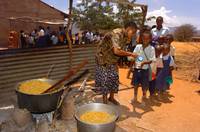Theme 3: Access and Inclusivity in Education: Addressing the barriers for the most disadvantaged and marginalised in times of pandemics.
Thematic lead: Richard Rose
Co lead: Jayanthi Narayan
Peer Reviewer: Jayanthi Narayan and Jennifer Roberts (UNHCR)
Lead Organisation: University of Northampton
Background
Across the globe the Covid-19 pandemic has emphasised inequalities that have resulted in some individuals being at greater risk than others. Factors such as age, ethnicity and socio-economic status have all been highlighted as significant factors in both the spread of the disease and mortality rates. It is evident that some marginalised groups, such as migrant workers, homeless people and those living in poor housing conditions have been more severely affected than others who live a more comfortable lifestyle. In addition, national distribution of resources and political and economic decisions made in recent years have been seen to place severe strain upon health service professionals and those working in the care sector.
While these factors appear to be self-evident, data and exemplification remains limited. This is a new disease and very little is known about it. However, the impact of the pandemic upon the lives of specific groups is becoming clearer and is an area worthy of investigation. Research in this area can be justified on both scientific and humanitarian grounds and is important if we are to be better prepared for future pandemics of this nature.
This group, with expertise in the areas of inclusion and marginalisation is in a strong position to illuminate the current situation for marginalised groups and individuals. In the limited time available for this project we should endeavour to provide useful data which might be of assistance to policymakers who have a responsibility for managing such situations.
Definitions for use throughout this project
When working on this project please use the following definitions for guidance
Inclusivity (Inclusion)
UNESCO have defined INCLUSION as: Inclusion is seen as a process of addressing and responding to the diversity of needs of all learners through increasing participation in learning, cultures and communities, and reducing exclusion within and from education. It involves changes and modifications in content, approaches, structures and strategies, with a common vision which covers all children of the appropriate age range and a conviction that it is the responsibility of the regular system to educate all learners.
Disadvantaged
Disadvantaged individuals or groups are those who are denied access to those rights and opportunities that are available to the majority of their peers. Disadvantage may result from attitudes to disability, culture, ethnicity, religion, caste, class, religion, socio economic status, gender or sexuality. It often results from conditions of poverty but can also be a condition related to natural or man-made catastrophe (such as warfare, earthquake or pandemic).
Marginalised
People are marginalised when they are either denied an opportunity to voice their opinions or lack the ability or authority to express their views to those who have control over their lives. Such situations result in denial of access to human rights and those conditions that enable individuals or groups of people to live with dignity within their communities.
Pandemic
A pandemic is a disease outbreak that spreads across countries or continents. It affects more people and takes more lives than an epidemic.
*Picture courtesy of The Commonwealth Secretariat

